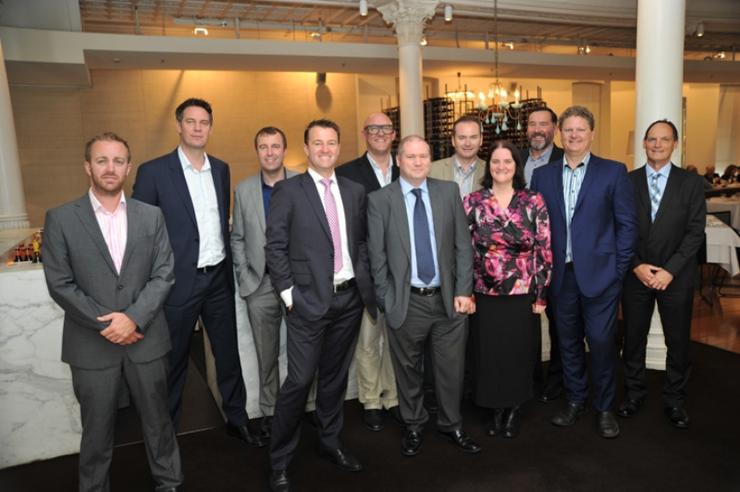
From left: Allan Swann (ARN), Allan King (Infront Systems), James Sillence (EMC), Andrew Thomas (Thomas Duryea), Stefan Gillard (Engineroom.io), Rodney Gedda (Telsyte),
Anthony Davis (Nexenta), Jennifer O’Brien (ARN), Richard Denyer (Fusion Systems), Matthew Swinbourne (NetApp), Phil Lancaster (Bluechip Infotech)
Who says storage can’t be sexy? It’s fast-paced, seeing revolutionary technological change, players are striving to innovate and meet customer’s ever-growing demands for escalating data, and it is adapting to the impact of the sexy business game-changers like Cloud computing and Big Data.
ARN's Storage Roundtable: Ensuring business continuity and building opportunities was sponsored by Bluechip Infotech, EMC and Fusion Systems. The full slideshow of the event can be seen here.
Certainly, today’s Cloud, Big Data, and always-on high-performance work environments means that bad storage decisions can cost business opportunities – and therefore it’s imperative to embrace a good storage strategy. Forty per cent of businesses who encounter a disaster and lose access to their data for more than 24 hours go out of business completely, and the average global cost of downtime is $300,000 per hour.
With the increased pressure on the business to maintain and manage its escalating data, storage is no longer considered boring (or even unsexy), and now more than ever the storage market is ripe with opportunity.
With that in mind, a number of industry experts sat down to discuss the changes in the storage landscape, highlight the growing market opportunities and challenges faced by storage providers and customers, and discuss the evolving customer relationship with service providers.
CHOICE GALORE
There are more changes than ever before in the storage arena. Bluechip Infotech director, Phil Lancaster, couldn’t agree more, saying at this time in history, more than any other, there are so many changes in storage – and the fact partners are embracing a myriad of vendor solutions in their portfolio is changing the customer landscape.
“In as little as the last 12 to 18 months it has become suddenly normal for a partner that you’ve talked to who might have only ever sold EMC or NetApp, for example, to have three or four storage vendors in their portfolio,” he said.
EMC senior presales manager, James Sillence, said the growing array of storage technology options is good for the customer.
“Every technology, every architecture tends to have a superpower, but it also tends to have a kryptonite. So there’s this concept that customers need choice. Fundamentally, one architecture doesn’t suit every opportunity; it doesn’t suit every requirement and actually the customer has to be able to choose what architecture from vendor N and vendor E is going to suit their particular requirements,” Sillence said.
“It’s about giving the customer the choice so they can put their workloads on a platform which is going to meet their economic needs, their compliance needs, their scalability needs and their dollar per gig needs. It is about customer choice.”
Telsyte senior analyst, Rodney Gedda, agreed that change is upon us, explaining how choice in terms of platforms and delivery models has fuelled the storage market momentum – which means resellers need to transition to a services-led play with a focus on annuity revenue in order to embrace the change.
“We’ve got a situation where we have a growing amount of choice in how we procure our storage. We can be pure Cloud through a managed service, or it could be an on premise that’s delivered as a managed service in terms of the cost per service storage unit like a leasing arrangement. Tomorrow’s reseller needs to balance the project work and the system integration work that they’re use to (and built the business on) with a managed services approach and annuity revenue model,” he said.
Certainly, complexity and choice inspires market opportunities, and Gedda said one of the biggest hot spots at the moment is hybrid Cloud. “The focus can be on multiple delivery models, which forms the hybrid Cloud. It’s not just a case of on premise or Cloud, but it’s a combination of Cloud [Software-as-a-Service), managed services and on premise that a company is engaged with.”
NetApp technical manager ANZ, Matthew Swinbourne, said hybrid Clouds will become the dominant vision for enterprise IT – a key trend to sweep the storage market.
He said the tension within IT about moving to the Cloud will resolve itself as organisations recognize that a hybrid Cloud model is needed to serve their application portfolios. CIOs will sort their portfolio into: applications that require complete IT control (using on-premise private Clouds); applications that can be shared with a third party (using enterprise public Clouds); applications with highly variable workloads (using hyper scale public Clouds); and applications that can be addressed with Software-as-a-Service offerings.
Swinbourne said IT will act as the broker across the various Cloud options, and there will be an increasing need to move application data and maintain consistent storage service levels across the different Clouds.




